
The Trump administration yesterday announced new sanctions against Iran's defence ministry and others involved in the country's nuclear and weapons programme to support US assertion that all UN sanctions against Teheran are now restored, a move key allies such as the Europeans dispute.
US Secretary of State Mike Pompeo, flanked by other top members of President Donald Trump's national security team, also told newsmen that Washington had imposed new sanctions on Venezuelan President Nicolas Maduro, who has forged closer ties between Caracas and Teheran.
"For nearly two years, corrupt officials in Teheran have worked with the illegitimate regime in Venezuela to flout the UN arms embargo," Mr Pompeo said. "Our actions today are a warning that should be heard worldwide."
Mr Pompeo said that Mr Trump has issued an executive order "that is a new and powerful tool to enforce the UN arms embargo".
He did not offer details on what the US sanctions were.
Treasury Secretary Steven Mnuchin, who appeared with Mr Pompeo, also announced separate sanctions on the Atomic Energy Organization of Iran.
The US has triggered a "snap back", or resumption, of virtually all UN sanctions on Iran, including the arms embargo, to come into effect at 8pm on Saturday.
A major part of Washington's new push is an executive order targeting those who buy or sell Iran conventional arms.
Under the 2015 nuclear deal, which the United States had unilaterally pulled out of in 2018, the UN conventional arms embargo is set to expire on Oct 18.
Other parties to the nuclear deal and most United Nations Security Council members have said they do not believe the US has the right to reimpose the UN sanctions and that Washington's move has no legal effect.
Last Friday, Britain, France and Germany told the Security Council that UN sanctions relief for Iranagreed under the 2015 nuclear dealwould continue beyond Sunday, despite the US' assertion.
Separately, 56 previous prime ministers, presidents, foreign ministers and defence ministers from 20 North Atlantic Treaty Organization (Nato) countries, plus Japan and South Korea, have released an open letter imploring their current leaders to join the Treaty on the Prohibition of Nuclear Weaponsthe pact negotiated in 2017 that is now just six ratifications shy of the 50 needed to take effect.
The letter, released on Sunday on the eve of the UN's 75th anniversary commemoration at the annual General Assembly, asserted that the risks of nuclear-weapons use have escalated in recent years "whether by accident, miscalculation or design".
Pointing to the Coronavirus pandemicwhich UN officials have called the greatest challenge in the organization's historythe letter writers said: "We must not sleepwalk into a crisis of even greater proportions than the one we've experienced this year."
The signers included previous prime ministers of Canada, Japan, Italy and Poland.
The letter's release was coordinated by the International Campaign to Abolish Nuclear Weapons, a Geneva-based group that won the 2017 Nobel Peace Prize for its role in negotiations that led to the treaty.
REUTERS, AGENCE FRANCE-PRESSE, NYTIMES, BLOOMBERG